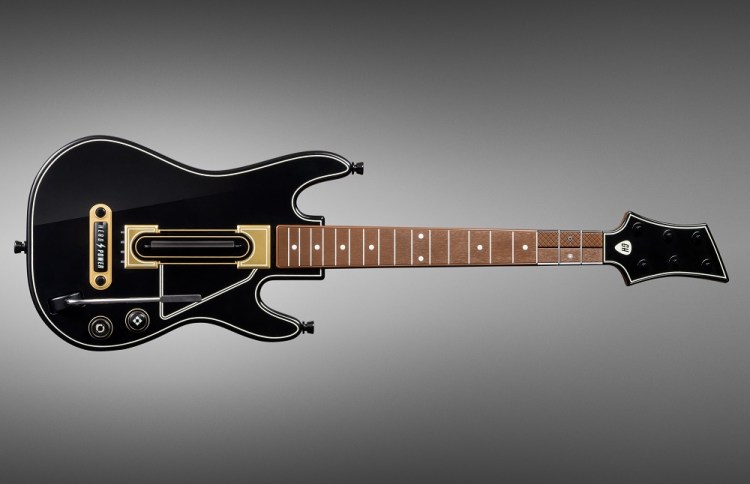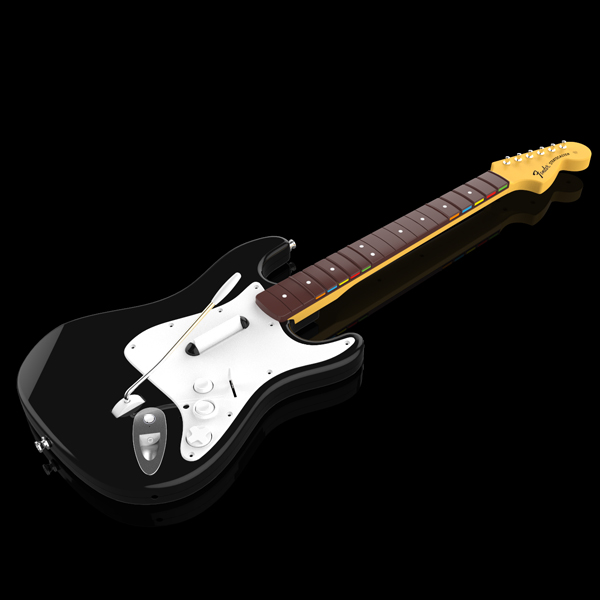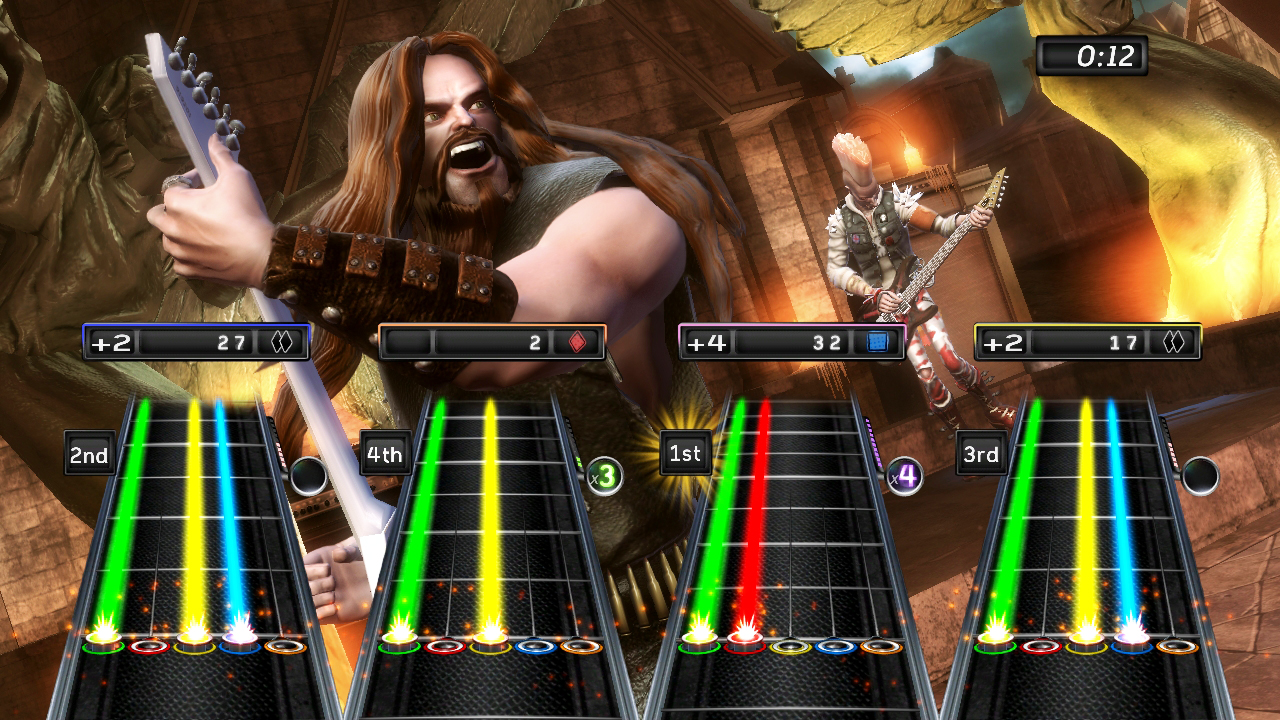Oversaturation and stagnation
Both Activision and Harmonix made the most of the ripe market with sequels to their franchises following the successes of the original releases, but more than 20 sequels and spin-offs that came from these efforts in the next few years oversaturated the market, turning customers off. Before the end of it all, even more add-ons and DLC releases rushed the market, making the situation even more noisy. It seemed that the goal was to annualize these games, much like Madden or Call of Duty, but that ended before it could really begin. Like a band with too many players on the stage, the game music space was a mess and no one wanted to listen.
As the previous console cycle wrapped up and the next one began, the end of this type of rhythm game seemed imminent. Activison stopped production of Guitar Hero in 2011, and it took a few years, but the company officially pulled all of the Guitar Hero DLC offline early in 2014. Harmonix continued DLC support but stopped development of the Rock Band franchise.
Despite all of the varied releases and spin-offs, the problem was that all of these games looked nearly identical to each other. All featured rock music set to descending rows of colored bars that would have players trying to mash corresponding colored buttons on a guitar-shaped controller in time. Save for the addition of new controller types to the original formula, none of the subsequent releases provided enough of an innovation to make the continual releases worth purchasing. If you had one, you had them all.
Piers Harding-Rolls, the director of games research at intelligence firm IHS, says that it was time for a break.
“Overexposure to an avalanche of DLC or track packs, regular releases and multiple variations of peripherals meant it was time for both Guitar Hero and Rock Band to take a break,” said Harding-Rolls. “There was not enough innovation there to maintain interest. During their hiatus other music games such as Just Dance have continued to do well, and I think some of the announcements today have reflected the success of Ubisoft’s title, namely the new music video online mode for Guitar Hero, GHTV.”
Changes are in store for the new batch of guitar games that could help address stagnation, but it’s likely that the core gameplay will remain the same for both games. New innovations will be important as fans played these games to death and know them inside out. Activison and Harmonix will need to find new ways to make these immersive, as the virtual rock star cover band and party game angles might have worn out their welcomes.
Activision has revamped the tone of the new Guitar Hero, literally turning the camera away from the player and on the virtual audience. While the crowd may not be impressed initially, it reacts to the quality of the performance, with better playing changing the mood of the audience. The goal was to channel stage fright — working through virtual stage fright will bring positive feedback, which could build confidence. This new approach could be a welcome one to players that are now used to looking at the same band for every song or who seek more realism in their virtual gigs
A notable change teased during the announcement of Rock Band 4 points to opportunities for player self-expression and song ownership, so that a game session isn’t just a skills-based affair. Harmonix also looks to improve the band simulation aspect with new features that will encourage interplay between instruments.
Cost: money and space
It was easy initially sign on for a plastic guitar controller-and-game bundle — the rock star appeal could not be denied. The eventual release of the drum and keyboard controllers were attractive enough for series enthusiasts, as it let friends play as a group in Rock Band. But as the game, peripheral, and DLC releases increased, so did the cost of entry for these games. Deciding to go ahead on the purchase of a $170 kit (with only one guitar — players had to buy another) became a major decision, but they had to consider the cost as a band kit was required for the full experience in the end. The highest cost requirement hit at the worst time, during a harsh recession.
Beyond this, manufacturing controllers to meet a minimum price point had controller quality riding a questionable line already. Dedicated players will attest to all of the controllers falling apart after regular use. And with the desire to top charts and perform perfect sets, anything less than an absolutely perfect controller would be unacceptable.
While stowing a single guitar in a closet or under the bed was initially fine, finding a place for two guitars, a drum set, a keyboard, and mic stands became a struggle for even the biggest home. The controllers that made these games so enjoyable became a burden as soon as the games were switched off.
From the details released for both upcoming games it seems that the storage problem will return this year.
At least Harmonix is counting on players still owning some of these controllers. The Rock Band maker plans to make its past instrument peripherals compatible with this next game, though it’s still working on the logistics and tech involved. It also plans to release a new controller that it says will be similar to the form and function of previous controllers. It also confirmed that hardware company Mad Catz would return as the hardware provider for Rock Band 4.
Guitar Hero will also see a new controller, and Activison says that it worked to innovate over the old five-button colored row system with it. Its redesign has buttons on the controller neck laid out in two layered sets of three, giving players’ pinkie fingers a break — a known problem for new players. But creator FreeStyleGames says that the system would provoke new challenges to veteran Guitar Hero players.
History repeating
It’s not like music started or ended with Guitar Hero and Rock Band. Before them, PaRappa the Rapper and Beatmania paved the way for rhythm gaming, and Harmonix’s Frequency and Amplitude later carried the torch. Konami’s Bemani division opened the door for dedicated controllers in Japan. And dance mat and arcade titles like Dance Dance Revolution were hot for a stretch, though these never reached the success commercial of the post-guitar era of sensor-based dance games such as Ubisoft’s Just Dance and Harmonix’s Dance Central.
The video game industry is fad-friendly. Game trends explode out of nowhere and then die, only to come back later refreshed in some way. Like JNCO jeans and Pee-wee Herman, Guitar Hero and Rock Band are slated for a comeback. Never underestimate nostalgia.
EEDAR’s Patrick Walker says that it could be a good time for their return.
“While the music genre suffered from a oversaturation of releases in the latter half of the last console generation, enough time has now passed that there is likely pent-up demand for a new peripheral release from fans of the genre who have moved on to next generation systems, ” Walker said.
He says that new business models combined with new social services could be big for games such as Guitar Hero and Rock Band.
“The rise of games as a service business models, social media sharing, and streaming content services like Twitch creates an opportunity for a reimagination of what a music game can be,” Walker said. “Because of this I view Guitar Hero’s planned creation of a service as a strength because it has the potential to synchronize with a broader trend in the industry — the more rapid delivery of updated content to an engaged community of online players.”
Harding-Rolls says that both should do well, though they may not be as successful as their predecessors.
“I think they will be successful, driven by number of factors, including the availability of new platforms to play the games on, a fresh audience, and nostalgia from lapsed players,” he said. “It also looks like both Harmonix and Activision are looking to innovate away from older versions of the games. Certainly in the case of GH Live, this is not a reissue but an entirely new experience FreeStyleGames is building.
“Will they be as big as the original games? Probably not on console as the old games sold incredibly well at their commercial height, but with the release on additional platforms there is an opportunity to monetize a broader audience.”
Hopefully, lessons from the past will pervade the approaches this time around for Guitar Hero and Rock Band. If Activison and Harmonix can find the catalyst to make guitar games interesting again, these companies could find themselves back on top of a new rhythm game craze.
This year should be interesting for the music game space. Harmonix has chosen to stick to its guns, going as far as adding backward support for its controllers and song library. And Activision has rebooted Guitar Hero, with a new controller, in the hopes that it can innovate.
The game industry is in for a battle of the bands once again.
VentureBeat's mission is to be a digital town square for technical decision-makers to gain knowledge about transformative enterprise technology and transact. Learn More



